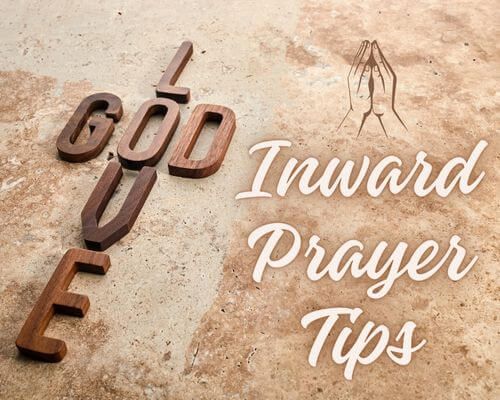Prayer is often seen as an important aspect of Christian life, but what does the Bible say about it? While there are many forms of prayer, the Bible emphasizes the importance of connecting with God from the heart. For Christians, the Bible isn’t just a religious text; it's a roadmap to understanding this deep connection.
More than just a ritual or duty, prayer is the heartbeat of a thriving relationship with the Divine.
Inward prayer, as it's often called, is about cultivating a deeper relationship with God through personal reflection and contemplation. It's also about building your faith as your pray.
In this blog post, we'll explore what the Bible says about prayer, how we can apply these teachings to our spiritual practice, and how to authentically connect with God.

Prayer, as defined by many, is a sacred dialogue between man and the Almighty. While various religions have their distinct rituals and traditions, Christianity anchors its understanding of prayer in the Bible. It's not about eloquence or duration but about genuine connection and surrender.
The Bible is filled with prayers, from the Lord's Prayer to the Psalms, and Bible verses that serve as examples of how we can approach prayer.
One of the key messages that emerges from these prayers is the importance of humility. In James 4:10, we read, "Humble yourselves before the Lord, and he will lift you up." This verse reminds us that prayer should be approached with a sense of reverence and surrender, acknowledging that God is the One who is in control.

Scripture assures believers that God is attentive to their cries. However, like any meaningful relationship, it's not just about asking; it's about understanding and connecting.
Questions such as, "Why wasn't my prayer answered in the way I wanted?" or "What is the point of praying?" arise in many believers' minds. Yet, the Bible sheds light on these concerns.
Another important aspect of prayer that we see throughout the Bible is the idea of persistence. In Luke 18:1-8, Jesus tells the parable of the persistent widow who kept coming to a judge for justice until he finally granted it to her.
This parable teaches us that we should not give up in our prayers, but rather persevere in our requests to God. This doesn't mean that God will always grant our requests, but rather that our prayers can have a transformative effect on us.

Inward prayer is about connecting with God from the depths of our hearts and souls. When we pray from the heart, we're more likely to experience a sense of peace and calmness, even in the midst of life's challenges.
One way to cultivate inward prayer is through the practice of silence and meditation. In Psalm 46:10, we read, "Be still, and know that I am God." This verse encourages us to take time to quiet our minds and hearts so that we can become more open to God's presence in our lives.

Important Considerations Before You Pray:
Divine ears are attentive to your heartfelt prayers.
Even when it feels like whatever you ask you're speaking into the void, He listens. God hears all your prayers. Read and meditate on the following Scriptures:
Psalm 139:4
"Before a word is on my tongue, behold, O Lord, you know it altogether."
1 John 5:14-15
"And this is the confidence that we have toward him, that if we ask anything according to his will he hears us. And if we know that he hears us in whatever we ask, we know that we have the requests that we have asked of him."
1 Peter 3:12
"For the eyes of the Lord are on the righteous, and his ears are open to their prayer. But the face of the Lord is against those who do evil."
James 5:16
"Therefore confess your sins to each other and pray for each other so that you may be healed. The prayer of a righteous person is powerful and effective."
It's encouraging to know that our prayers are not just empty words, but they are heard by a loving and attentive God. However, it's important to remember that prayer is not simply about asking for things. It's also about developing a deeper relationship with God and aligning our will with His.
How Can I Be Sure I am Praying in the Will of God?
One way to ensure that you are praying in the will of God is by aligning your prayers with His Word. The Bible is a guide for our lives and contains God's promises, instructions, and principles.
By studying and meditating on His Word, we can gain a better understanding of His will for our lives and pray accordingly. It is also essential to pray with a humble and submissive heart, trusting in God's sovereignty and ultimate plan for our lives.
Overall, consistent prayer, study of Scripture, and submission to God's kingdom are key factors in ensuring that we are praying in His will. An excellent article to read in answer to this question can be found at GotQuestions.org.

So how do we align our will with His? Study what the Bible says and ask for His wisdom in discerning His will.
Late Bible teacher Warren Wiersbe, in his With the Word Commentary (Thomas Nelson, 1991), pointed to the importance of motive in discovering the will of God: “When you seek to edify others and glorify the Lord, you will know what to do.” (See 1 Corinthians 10:31; 14:26; Ephesians 4:29; Colossians 3:17; and Hebrews 10:24–25.) In any situation, obey what you already know to be God’s will for your life. From GotQuestions.org
God is deeply concerned about your well-being.
He longs to be a part of every aspect of your life.
1 Peter 5:7 - "Cast all your anxiety on him because he cares for you."
Psalms 55:22 - " Cast your burden on the Lord, and he will sustain you; he will never permit the righteous to be moved."
Psalm 52:8 - "But I am like a green olive tree in the house of God. I trust in the steadfast love of God forever and ever."
God's love for us is unchanging and unconditional, and He wants us to come to Him with all our needs and concerns. Prayer is a way for us to pour out our hearts before God, knowing that He cares deeply about everything in our lives.

Tips for Cultivating Inward Prayer:
- Find a quiet place where you can be alone with your thoughts and connect with God.
- Take deep breaths and focus on clearing your mind of distractions.
- Start by simply being present in the moment and acknowledging God's presence.
- Use simple phrases like "Thank you, God" or "I love you, Lord" to center your thoughts on Him.
- Practice stillness and silence as you wait for His guidance and direction in your prayers.
By incorporating these tips into your prayer routine, you can deepen your relationship with God and become more open to His will in your life.
Remember, prayer is a powerful tool for growth and transformation, so don't be afraid to make it a regular part of your daily routine.
Take time to upgrade your spiritual life by cultivating inward prayer. Be intentional in seeking God's presence and allowing Him to work in your heart and mind through the practice of prayer.
Keep the passages above close to your heart as a reminder of the power and importance of prayer in our lives.
Have a special place to go to to be a place where you can connect with God, find peace and hope and grow in your faith.

What challenges keep us from praying?
Many challenges can hinder our prayer life, such as busyness, distractions, doubts, and lack of discipline. Often we get caught up in the busyness of life and neglect setting aside time for prayer.
Technology and social media can also be significant sources of distraction when trying to pray. Doubts about the effectiveness or importance of prayer may also cause us to neglect it.
How can we overcome these challenges?
To overcome the challenges of busyness, distractions, doubts, and lack of discipline in our prayer life, it's essential to prioritize and make time for prayer, setting aside distractions such as technology and social media.
It's also powerful to have an accountability partner or group who can encourage us and hold us accountable in our prayer life. Additionally, remembering the power and effectiveness of prayer, backed by God's promises, can help overcome any doubts we may have.

Two Special Prayers in Scripture
One of the most famous prayers from the Bible is the Lord's Prayer, which is recited in many Christian traditions. This prayer, found in Matthew 6:9-13, serves as a template for how we can approach prayer. Here we can pray for our daily bread (provision) as well as forgiveness for our sins and protection from the evil one,
It begins with acknowledging God's holiness, sovereignty, and authority, and ends with a request for protection and guidance. This prayer reminds us that prayer is not just about asking for things, but about seeking a deeper relationship with God.
The second special prayer is the beautiful prayer of Jesus in John 17. Take time to read this beautiful, powerful prayer Jesus prays to His Father in Heaven. In this prayer, Jesus prays for Himself, then His disciples, and lastly for all the saints (Paul called all followers of Jesus saints!).
This is an intercessory prayer and is often called Jesus' High Priestly Prayer. The high priest is a descendant of Aaron with the responsibility of interceding for Israel before God.
Christ Jesus, our High Priest, continuously amazes me. On His final day before His death, He selflessly prayed for us to truly know God and experience His boundless love. Even now, as our risen High Priest, He intercedes for us, longing for us to be united with Him. His unwavering devotion and love are truly remarkable.

Intercessory Prayer - Another Important Prayer
Finally, the Bible also emphasizes the importance of praying for others, or intercessory prayer.
In 1 Timothy 2:1-2, we read, "I urge, then, first of all, that petitions, prayers, intercession and thanksgiving be made for all people—for kings and all those in authority, that we may live peaceful and quiet lives in all godliness and holiness."
This verse reminds us that prayer is not solely for our own personal benefit, but also for the well-being of others. Therefore, let us frequently and sincerely offer prayers on behalf of others, extending our heartfelt intentions for their sake.

Why should I pray?
Prayer strengthens your relationship with God and aligns your will with His. It also allows you to communicate with Him and seek His guidance, comfort, and wisdom.
How do I know what to pray for?
The Bible is a great source of guidance on what to pray for. You can also listen to the Holy Spirit and trust in His leading as you pray. Additionally, praying according to God's will (as revealed in the Bible) is always a sure way to pray effectively. So, let us continually seek God's will and guidance as we pray for ourselves and for others.
Why wasn't my prayer answered in the way I wanted?
Prayer is not a magic formula that guarantees a specific outcome. God's plans and timing are perfect, and sometimes the answer to our prayers may not align with what we want or expect.
Trust in His sovereignty and have faith that He knows what is best for us. Keep praying and seeking His will, knowing that He has a greater purpose in mind.
Does God really listen to my prayers?
Absolutely. The Bible consistently assures that God hears and responds to sincere prayers. He promises to never leave or forsake us and is always ready to listen. So, rest assured that your prayers are heard by a loving and attentive God.
Can I pray for material things?
While it is not wrong to pray for material blessings, it's important to keep our focus on eternal matters and prioritize spiritual growth above physical possessions.
We must also align our desires with God's will and trust in His timing for all things. So, let us pray for contentment and thankfulness in all circumstances while trusting that God will provide for our needs according to His perfect plan.
What's the point of praying?
Prayer is a powerful tool that connects us to God and allows us to communicate with Him. It strengthens our faith, brings peace and comfort in difficult times, and aligns our hearts with His will.
It also allows us to express gratitude, confess our sins, and intercede on behalf of others. Ultimately, prayer deepens our relationship with God and transforms our lives. So keep praying, and see the amazing ways God works in your life!
Do I need to be in a special place to pray?
No, you can communicate with God anywhere, anytime.
Is there a right or wrong way to pray?
While there are some guidelines you might use like the acronym ACTS (Adoration, Confession, Thanksgiving, and Supplication), what matters most is sincerity and humility in approaching God. Prayer doesn't have to be fancy or eloquent; it's simply a conversation with our Creator.
Being honest, open, and sincere in our communication is what truly matters. Just remember to pray with faith, thanksgiving, and in alignment with God's will. And don't forget to listen for His response!
Why doesn't God answer all prayers?
God always responds, but His answer might be "yes," "no," or "wait." His wisdom surpasses ours.
What is the most powerful prayer?
The most powerful prayer is one that comes from the heart and is sincere. It can be a simple conversation with God, expressing your thoughts, feelings, and needs. It can also involve praising Him for who He is and thanking Him for His blessings in your life.
The most important thing is to approach God with humility and trust, believing that He hears and responds to our prayers. Let your prayer be a genuine and personal connection with God, and you will see the great power of prayer in your life.
How often should I pray?
The Bible encourages believers to pray continually, making it a way of life rather than an occasional activity.
What is a powerful prayer for everyone?
A powerful prayer for everyone is the Lord's Prayer, which was taught by Jesus himself. It covers all aspects of our relationship with God, including acknowledging His holiness and kingdom, praying for His will to be done, asking for daily provision and forgiveness, and seeking protection from temptation.
This prayer can be prayed by anyone and has been a source of comfort and guidance for over two thousand years.
What are the three main points of prayer?
The three main points of prayer are communication, connection, and transformation.
Through prayer, we communicate with God, building a relationship with Him and seeking His will. It also connects us to Him on a deeper level, allowing us to experience His presence and guidance in our lives. And finally, prayer has the power to transform us, shaping our hearts and minds according to God.
Is there a good reference to prayer that is trustworthy?
Yes, apart from the Bible as a trustworthy reference for prayer, I find that GotQuestions.org is an excellent reference point for many questions I have about anything relating to our Christian lives.

The transformative power of prayer is an intricate blend of divine intervention and personal growth. Remember, the Bible, as Christianity's foundational text, provides a blueprint on how to engage in this sacred dialogue with God.
Prayer isn't just about requests; it's about relationships. Through understanding and embracing biblical teachings on prayer, Christians can find deeper connection, clarity, and purpose in their spiritual journey.
By taking time to quiet our hearts and minds, and approaching prayer with reverence and surrender, we can tap into the transformative power of prayer and experience a deeper sense of connection with God and the peace of our souls.
So as you venture into your prayers with the Divine, let many words from the Scriptures be your guiding light. And all the Lord's people said "Amen!"
Thank you for visiting our Christian blog, and we look forward to sharing our passion for Christian theology and literature in future articles with you!










Member discussion